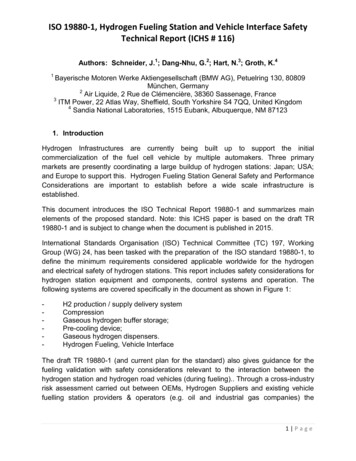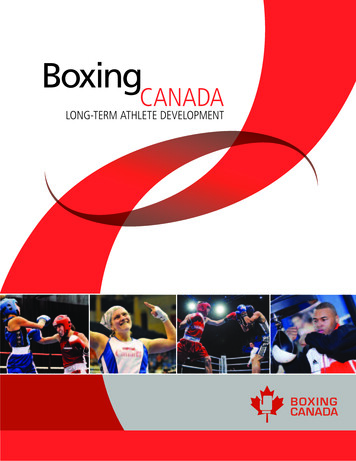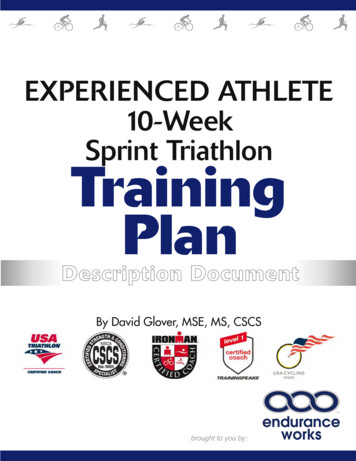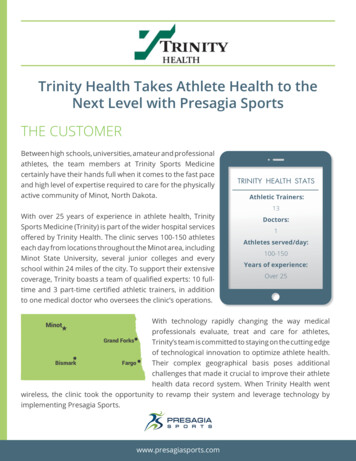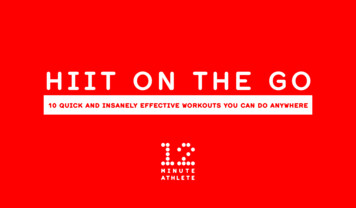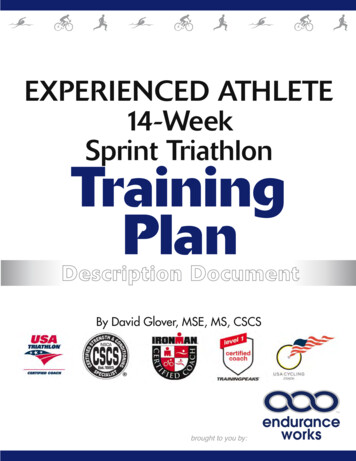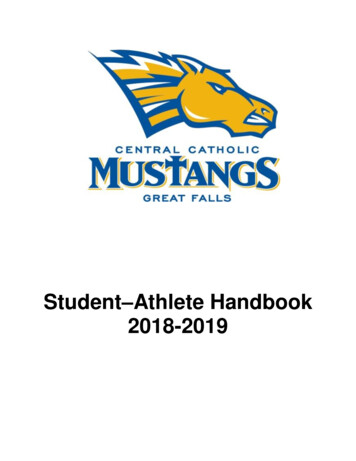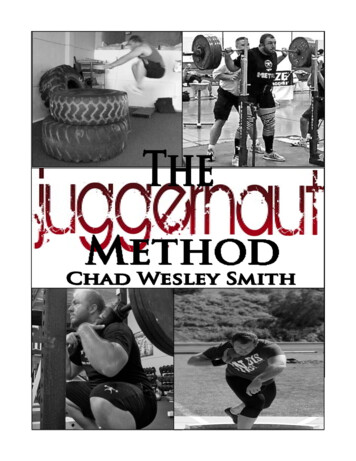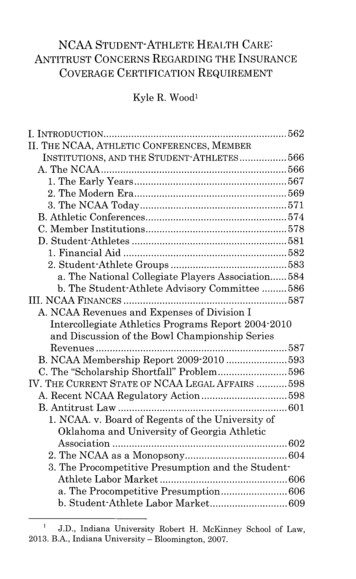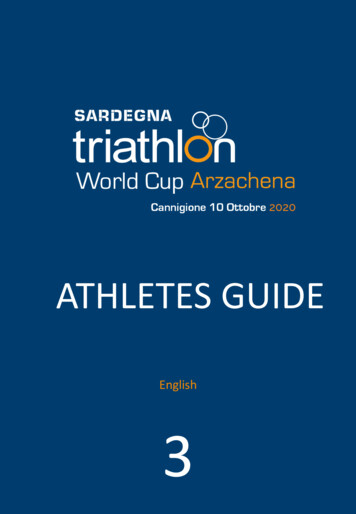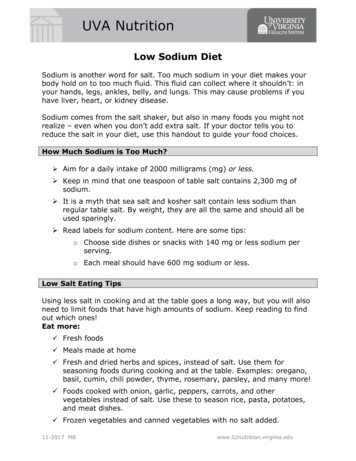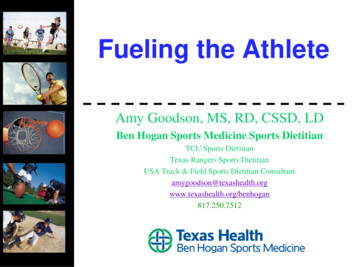
Transcription
Fueling the AthleteAmy Goodson, MS, RD, CSSD, LDBen Hogan Sports Medicine Sports DietitianTCU Sports DietitianTexas Rangers Sports DietitianUSA Track & Field Sports Dietitian h.org/benhogan817.250.7512
Why Sports Nutrition? Performance: Pre-exercise nutrition fuelsworkouts and gamesHydration: Preventing decreases inperformance due to dehydrationRecovery: Post-exercise nutrition helpsathletes recover & repair after a workoutSupplements: What’s good and badBody composition changes: Decrease body fat, increase lean massLose weight/gain weight
Carbohydrates Purpose: Body’s “choice” for energy; primaryenergy contributor during exerciseTypes of carbohydrates: simple & complex Simple: jelly, cookies, hard candy, juiceComplex: bread, pasta, cereal, bagelsWhole grains and wheat productsFruitsVegetablesDairy productsSports drinks/gels/goos/blocks
Carbohydrates: Best Choices Why grains? Rich in carbohydrates, B vitamins, give lots ofenergyShould be the largest part of your dietBest choices Wheat bread, oat bread, wheat bagels, wheatEnglish muffins, wheat tortillasCereals: Total, Shredded Wheat, Cheerios, GranolaOatmeal, Cream of WheatBrown Rice/Wheat or Multi-grain PastaWheat crackers/whole grain granola bars
Protein: Best Choices Purpose: Build/repair muscles, hair/nailgrowth, boosts immunity, RBC production Lean meat Eggs and egg whitesLow-fat dairy products Chicken, turkey, lean ham, lean red meat, fish,tuna, turkey bacon and turkey sausageTake the skin off of meatMilk, cheese, yogurt, cottage cheeseWhey protein powders and smoothies/shakesmade with it whey protein absorbs very quicklyNuts, seeds, peanut butter have some protein
Fat Purpose: major energy source in bodyFunctions: Helps cushion the body’s organsRegulates body temperatureAids in fat-soluble vitamin transport & absorptionFat usage in exercise: In aerobic exercise, both fat and carbohydrate areused for fuel – ex. jogging, biking, swimmingIn anaerobic exercise (high intensity),carbohydrate, a decreased amount of fat, is theprimary source of fuel for exercise
Fat: Best Choices Saturated Fats: “Bad Fats” Fried foods, pastries/baked goods, creamy foodsUnsaturated Fats: “Good Fats” Peanut butter, almond butter, nuts, seedsOlive oil and Canola OilAvocadoFlaxseed or flaxseed oil Can buy milled, as oil, or in breads and cerealsFats in fish like salmonRemember that you get some fat in dairyproducts, meats, whole eggs, and energybars/shakes
Pre-Exercise Meal Timing How much time should I allow for digestionof food? Allow 3-4 hours for large meal Allow 2-3 hours for smaller meal Sandwich, crackers/baked chips, fruitAllow 1-2 hours for a blenderized meal to digest Meat, pasta, vegetables, salad, rollSmoothie, protein drink/shakeCarbohydrate snack 30 minutes beforeexercise provides “energy burst” forperformance 50-70% carbohydrate, low-moderate protein
Pre-Exercise Eating Pre-exercise meal High carbohydrateLow in fat & fiber These slow down digestionModerate proteinCombine protein carbohydratePlenty of fluidsImmediate Pre-exercise Snack 30 minutes before workout/gameHigh carbohydrate, small amount of protein toprovide you with a boost of energy
Morning Training Lots of carbohydrate; more bland foods Good choices for early morning: Shake with carbohydrates & some protein Shake powder mixed with water or skim milk, fruit,1 scoop protein powder, ice and waterEnergy bar like Balance, Zone, Clif, Go LeanCrunchy, Luna, Power Bar Harvest/Triple Threat,Gatorade, OdwallaLow-fat granola bar like Kashi crunchy/chewy,Nature Valley, Quaker Oatmeal SquareFruit (i.e. banana, nothing very acidic)Plain bagel or dry cereal/granola mix
During Workouts Carbohydrate-rich foods/drinks Avoid fat, protein, & fiber when exercising slows digestion & increases time in whichenergy is available to be used100-300 calories of carbohydrates per hour,after the first hour of exercise Carbohydrates digest the quickest & thus provideenergy faster!30-60 grams of carbohydrate per hourFluid losses – match sweat losses Consume 5-10 oz fluid every 15-20 minutes
Mid-Practice/Workout Snacks Carbohydrates, some protein, little fat Energy barsGranola barsPlain bagelsPeanut butter crackersDry cereal/trail mix with minimal nutsHigh calorie shake (Ex: Muscle Milk Collegiate)Sports drink with snackAthletes losing weight Need to eat snack(s) during practiceConstantly drink sports drink
Post-Exercise Nutrition The three R’s to post-workout recovery: Replenish carbohydrate burned during exerciseRepair damage done to lean muscle massRehydrate the body to euhydration
Post-Exercise 2-Hour Window 2-Hour Window of Recovery Your body has a specific time period, post-exercise,when you are able to more effectively take upnutrients 0-45 minutes Best time to eat at least a snack muscles moresensitive to absorb nutrients!45 minutes – 2 hours Try to get a nice-size meal or larger snackThe window is the most important time to consumeplenty of carbohydrate, protein, & fluids toreplenish & refuelEssential if participating in twice a day training
What’s the proper balance?
Post-Exercise Eating 4:1 carbohydrate: protein ratio What is that? This ratio represents a food that has 4 grams ofcarbohydrate for every 1 gram of proteinWhy is that important 2 main reasons Body NEEDS lots of carbohydrate post-exercise toreplace energy stores Carbohydrates come first! Carbohydrates “help” protein enter the muscle cell;they “unlock” the cell to allow nutrients in Body needs some protein to start repairing tinymuscle tears
Carbohydrate: The Body GuardProtein onlyCarbohydrate Protein
Post-Exercise Eating Ratio of 4:1 4 grams carbohydrate for every 1 gram of proteinExamples: Snacks (if meal is not available w/i 45 minutes) Yogurt with 40 grams of carbohydrate, 10 grams ofprotein16-20 oz Low-fat chocolate milkGranola bar and 8-10 oz milkEnergy bar & GatoradeSmoothie made with 1-2 cups low-fat milk, fruit,cold water, ice, and 1 scoop protein powderReplacement shake (Powder or Smoothie King)
Nature’s Recovery Fluid Nature’s Recovery Fluid: Low-fat Chocolate MilkHow does it help with recovery? It is a 4:1 ratio of carbohydrates to protein Carbohydrates to replenish glycogen stores (milk is simplecarb)Protein to repair muscle breakdown (milk contains wheyprotein)90% water for hydration & to replace fluids sweated outPotassium which helps with fluid/mineral balance aswell as muscle contractionB vitamins that help convert food to energy to fuelworking musclesCalcium, phosphorus & vitamin D to promote, maintainand build strong bones
Hydration Pre-exercise 2-3 hours prior exercise: 16-20 oz fluid10 minutes prior exercise: 5-10 oz fluidDuring-exercise Really individualized to sweat rateEvery 15-20 minutes: 5-10 oz fluidWater and sports drinks Sports drinks especially after 1 hour of exercise and/or invery hot/humid conditionsPost-exercise 17-24 oz fluid for every pound lost24 oz if in 2-a-days or need to rehydrate quickly
Day-time Practice Eating Example Breakfast – 7:00-8:00 amMid-morning snack – 10:00 amLunch – 12:00-1:00 pmAfter school/pre-workout snack – 3:00 pmPractice – 3:00-5:00 pm Water & sports drinkIf on long run, 30-60g carbohydrate during 2nd hourPost-workout snack – 5:00-5:30pmDinner – 7:00 pmEvening snack – 9:00 pmBedtime – 10:30-11:30 pm
2-a-day Practice Eating Example 5:00am snack WorkoutPost-workout snack: chocolate milkBreakfast within 45 min-1 hour after practiceLunch 11:00am-12:00pmAfternoon (pre-workout) snack around 2pm-ishWorkout: Consuming water & Gatorade Granola bar, energy bar, banana, baggie of cerealMight want to consume energy bar or granola bar inthe middle of practice if possibleDinner within 45 min-1 hour after practiceEvening snack approximately 3 hours afterdinner
Weight Gain Tips Eat 6-7 meals/dayDo not skip breakfast; guys trying to gain weighttypically need 600-1000 calories in the morning Can eat and go back to bed if they have toDrink milk and/or juice with mealsEat a 30-min pre-exercise snack, every hour duringexercise, and immediately post-exerciseEat a high-calorie meal or shake right before bedMake high-calorie food exchangesConsistency!!!
High Calorie Food Exchanges Choose:Instead of: Bagel/Thick rollsWafflesGranolaPeanut butterNutsTrail Mix2% milkSautéed vegetablesMilk/juice at mealsSports drink at practiceBreadToastCerealButter or jellyCandyGranola barSkim milkSteamed vegetablesWaterWater
Weight Gain Food Ideas Add 2 Tbs. peanut butter to oatmealAdd peanut butter & honey to waffles,pancakes, toast, & bagelsAdd low-fat granola to cereal, oatmeal, oryogurtPut nuts on salad, tuna, in cereal & trail mixMix high-calorie protein powder with 2% milkDrink & make shakes with low-fat chocolatemilkEat a PBJ sandwich as a “dessert” post meals
Weight Loss/Leaning Out Tips Eat small meals often 5-7 times/dayDon’t skip meals & eat adequate portions Fist, palm, and plate rulesEat quality, healthy foods combining complexcarbohydrates, lean protein, & healthy fat at eachmeal & snack and lots of waterEat more carbohydrates in the morning, daytime,& around exercise. Eat a smaller quantity atdinner & late at night; use the fist rule at dinnerAvoid refined carbohydrates, fried food, alcohol,high fat foods, baked goods/pastries/doughnuts,creamy sauces/spreads/dips
Choosing Quality Calories QualityNot Quality-Oatmeal-Whole wheat bagel-Whole wheat crackers-Egg white omelet &2 whole wheat toast-Energy Bar & fruit-Grilled chicken, brownrice, green veggies-Salad w/lean turkey,nuts, fruit, & wheat toast-Low fat yogurt w/fruit-Peanut butter crackersPop-tarts, Corn FlakesCroissantChipsEgg & sausage biscuitCandy bar & CokeCreamy alfredo chickenpasta & breadstickSweet & Sour chicken stir fryFrozen yogurt w/toppingCheez-its or cookies
Common Issues: Cramping Typical causes: FatigueDehydration due to loss of electrolytesFoods to improve/prevent cramping High potassium foods Sports Drinks Bananas, strawberries, cantaloupe, raisinsAvocados, potatoes, beans, broccoli, spinachYogurt, milk, tomato juice, soybeansGatorade, PowerAde, Hydrade, AcceleradeExcessive problems Salt tablets and/or potassium supplement
Common Issues: Supplements Appropriate food supplements & vitamins Supplement Certifications Energy bars (Clif, Power Bar, Kashi, Gatorade)Energy shakes (Muscle Milk Collegiate, Myoplex, EASshakes, Rockin Refuel, Smoothies w/whey protein)Multi-vitamins/mineral supplementsFish oilSpecific vitamin/minerals (Calcium, Vitamin D, Iron)NSF-Certified for SportWADA Informed ChoicePerformance Enhancing Drugs to Avoid Steroids, Stimulants, Androstenedione, GrowthHormone, herbs, etc.
“Under-recovery” & Nutrition Under-recovery Failure to fulfill current recovery demandsCan lead to progressive fatigue and underperformanceNutrition Recovery Pre-run/workout fuel so body has energy to trainFueling immediately post-run/workout with carbohydrates,fluids, and some protein to promote muscle carbohydrate(glycogen) re-synthesis and repair of lean muscle mass tearsFueling on the “off-day” Off-day is a chance to recover nutritional status to 100%Athletes should consume meals and snacks as frequent astraining days including carbohydrate, protein, healthy fat, & lotsof fluidsThe “Gas Tank” – if you end Saturday with no gas in your carand add no fuel on Sunday, even though the car just sits still,will it have gas on Monday morning? No still empty!
Sports Nutrition Goals ENERGY: Eat often all day; approximately5-7 meals/day RECOVERY: Just as important as training Fuel adequately every day; try not to skip mealsand snacks be preparedIf recovery is not adequate, carbohydrate storeswill not be replenished & you will start with adecreased amount of energy next time you train orcompeteHYDRATION: Drink fluids all day, not justaround exercise
Pre-run/workout fuel so body has energy to train Fueling immediately postrun/workout with carbohydrates, - fluids, and some protein to promote muscle carbohydrate (glycogen) re-synthesis and repair of lean muscle mass tears Fueling on the “off-day”
